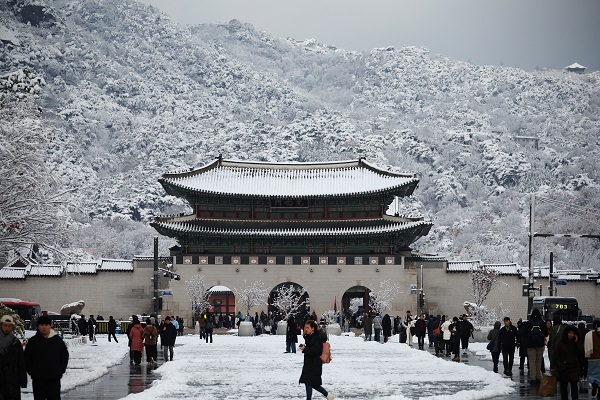 Gyeongbok palace is covered in snow, in central Seoul, South Korea, 27 November 2024;
Credit: Reuters/Kim Hong-Ji
Gyeongbok palace is covered in snow, in central Seoul, South Korea, 27 November 2024;
Credit: Reuters/Kim Hong-Ji
SEOUL (Reuters) - South Korea grappled with heavy snowfall for a second day on Thursday 28 November 2024, with dozens of flights cancelled, ferry operations suspended and at least five people reported dead in a cold snap, though conditions showed signs of easing.
The snowfall was the third-heaviest in Seoul, the capital, since records began in 1907, the Yonhap news agency said, citing data from the city.
"It's been snowing a lot today," said 73-year-old Lee Sook-ja as she tucked into some soup at Namdaemun market, one of the biggest in Seoul. "It’s freezing and chilly, but having a cup of hot fish cake soup really helps warm me up."
More than 40 cm of snow piled up in parts of Seoul by Thursday morning, forcing the cancellation of more than 140 flights, although weather officials subsequently lifted heavy snow warnings in the city's metropolitan area.
Yonhap reported at least five snowfall-related deaths in the province of Gyeonggi adjoining Seoul since Wednesday 27 November 2024, four people when structures collapsed under the weight of snow, and one in a traffic accident when a bus skidded on an icy road.
Police said eleven people were injured on Wednesday evening in a 53-vehicle pile-up on a highway in the central city of Wonju in Gangwon province.
Seoul's main airport, Incheon, was the worst affected, with passengers facing delays of about two hours on average, while 31% of flights were delayed and 16% cancelled on Thursday, plane tracking website Flightradar24 showed.
Authorities said about 142 flights were cancelled, and 76 ferry routes suspended, while media reported some train delays.
By noon, about 1,285 schools including kindergartens closed in Gyeonggi province, authorities said.
The unusually heavy November snow has been attributed to warmer-than-usual temperatures of the seas west of the Korean peninsula encountering currents of cold air.
Neighbouring North Korea has also received more than 10 cm of snow in some areas between Tuesday and Wednesday, state broadcaster Korean Central Television said.








